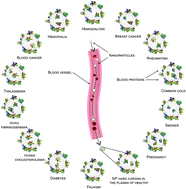
A collaborative effort headed by Dr. Mahmoudi from Stanford University, US, and the University of Medical Sciences in Tehran, Iran, Hajipour et al. evaluated effects of the altered protein composition of human plasma in different disease states on NP corona formation. Two NP materials were chosen for their analysis, hydrophobic polystyrene and hydrophilic silica, which are widely investigated for biomedical material approaches and currently evaluated for safety purposes.
NPs were exposed to plasma solutions of different patient populations to form hard protein coronas, after which the composition of NP protein coronas was analyzed using SDS-page, densitometry and zeta-potential measurements. Interestingly, the authors found that changes in plasma protein composition due to underlying conditions alter the protein decoration on NPs, resulting in an unpredictable biologic identity of the NPs and thus their biological fate. The severity of the condition was also found to impact protein deposition. Intriguingly, even among healthy subjects there was considerable variation in corona composition, creating even more of an impetus for personalized NP design.
Collectively, the researchers found that NP protein corona distinctly depends on particular condition, severity of condition and combination of conditions, with relatively low variation between subjects with similar health profiles. Moving forward, identifying the personalized protein corona for individual patients or at least the expected protein corona in specific patient populations may become an integral aspect of nanoparticle-based biomaterial therapies.
Personalized protein coronas: a “key” factor at the nanobiointerface
M. J. Hajipour, S. Laurent, A. Aghaie, F. Rezaee and M. Mahmoudi
Biomater. Sci., 2014, Advance Article DOI: 10.1039/c4bm00131a
Robert van Lith is currently a Ph.D. Candidate in the Biomedical Engineering department at Northwestern University, working on novel biomaterials to modulate oxidative stress in tissues. He received an American Heart Association Fellowship and Society for Biomaterials award for his work. He holds B.S. and M.S. degrees in Biomedical Engineering from Eindhoven University of Technology, the Netherlands. Read more about Robert’s research publications here.











